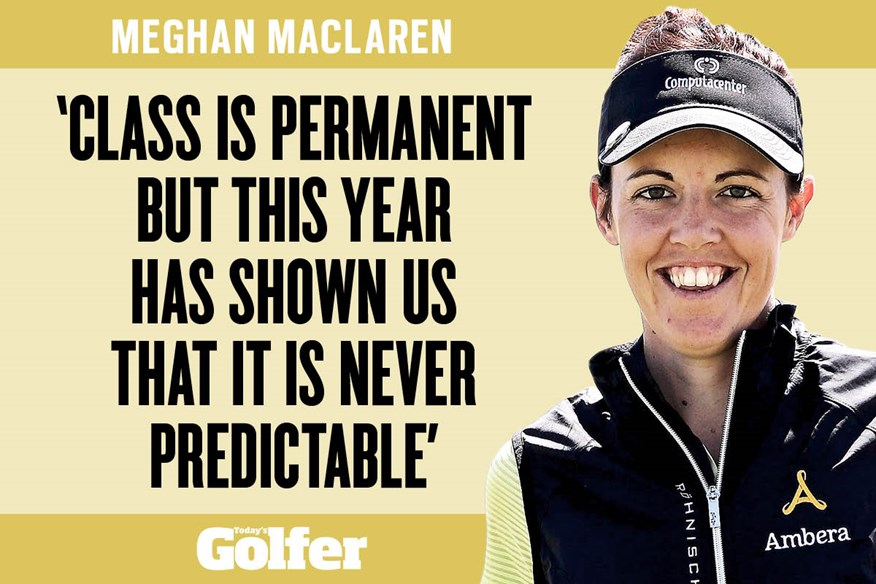Meghan MacLaren: “Class is permanent but success is never predictable”
Last updated:
Ladies European Tour star Meghan MacLaren explains that while class may be permanent at the highest levels of golf, it’s never a guarantee of success.
So far, 2021 has been the year of the comeback. In the last few months we’ve had Jordan Spieth, Lydia Ko, Ariya Jutanugarn, Brooke Henderson, Hideki Matsuyama – even Rory McIlroy could be included in this bracket. Huge names in the world of golf who all ended sizeable winless streaks with victories this year. Of the six, only two (McIlroy and Henderson) had won since 2018, but even they had waited nearly two years each.
RELATED: Evian Championship preview

With each of those victories this year, I think every golf fan struggled to believe it could have been so long since their last one. Both in the manner of each respective win and the echoes of dominance from years past. These serve as quiet reminders that golf is difficult, whoever you are, and no one is immune to the strangling hold of failure. Yet even with every onscreen stat and fabled ‘next Tiger’ label, we forget. There is simply too much brilliance in some players to contemplate them going missing.
In June 2017, that group of six players had a collective world ranking of 20 across their two respective ranking systems. That’s an average of 3.3 in the world. The worst-ranked player was Henderson at eight.
RELATED Best Ladies’ Golf Drivers
Every tour-level professional golfer has an immense amount of skill – they have to have to have earned that status. But these were and are the one percent of the one percent. The kind of players we expect to win on a regular basis. The kind of players the media want to question after a 15th-place finish; the kind of players who look as though they are destined to dominate for as long as they choose to.
Let me repeat: An average world ranking of 3.3, at the same point in time. Yet between them, they went a collective 6,027 days without a victory. Put another way, that’s more than 16 years.

I consider myself a fairly-balanced person, able to understand some of golf’s nuances. (Perhaps ‘understand’ is the wrong word; admitting that I can never understand is maybe as good as it gets). From my own experiences, from good amateur to elite amateur, to experiencing some success as a professional, as well as being an unashamed golf nerd, I know how fickle golf can be. Both in its success and its failures. But I still fall into the same trap time and again; whether it’s with my own golf or with those at the pinnacle, the players I watch most weeks.
RELATED Best Ladies’ Fairway Woods
When things are good, you simply don’t feel it can be much different. You can’t envisage real, destructive failure. Even when you remember any previous struggles, it feels remote; a different person; almost a sympathy that you didn’t know better then. But inevitably those struggles come back around. Whether old habits or new demons, technical failings or external circumstances – things happen. Part of the beauty and despair of golf is that perfection is unattainable.

There are such a myriad of factors that make up the one thing we are all eventually judged on: Results. Results in tournaments are the pay cheque, as well as the indicator of our worth. The knowledge of that fact in itself is enough to derail anyone at any given time. Never mind the technical competence required to keep a clubface within a degree margin while moving it at 100mph. Or the mental strength required to assess the trouble and appropriate strategy on the 18th hole of the final round of a tournament when you have a one-shot lead, without letting that awareness turn into fear. Or the emotional stability required to respond after a run of bogey, double, double and then fighting your way up the next fairway into a howling 30mph wind that only serves as the symbolism of the new task now in front of you. Just finding a way to put one foot in front of the other can be hard.
RELATED Best Ladies’ Golf Balls
I could write a book about all the things that can impact golf performance, and I would still miss out far more than I’d cover.
Sometimes in golf we don’t even recognise the actuality of these factors until they’ve happened to us. That could well be the essence of the group of aforementioned players. The longer we all play golf, the more scar tissue we inevitably accumulate. It’s impossible not to, whether you’ve won 10 Majors or you’ve never broken 80.
Perhaps the thing that separates is the ability to trust what lies underneath that scar tissue.
READ MORE FROM MEGHAN MACLAREN
“What you can learn from pro golfers’ mentalities”
“How to make the most out of your golf IQ”




